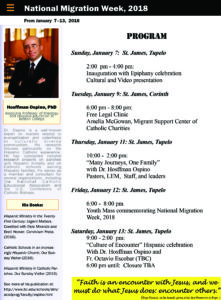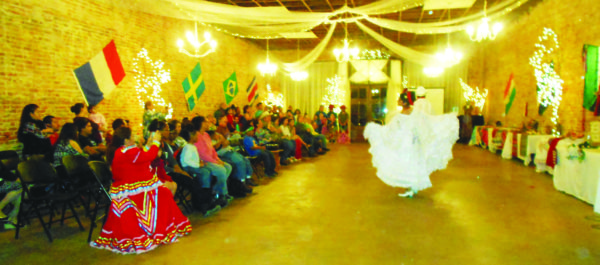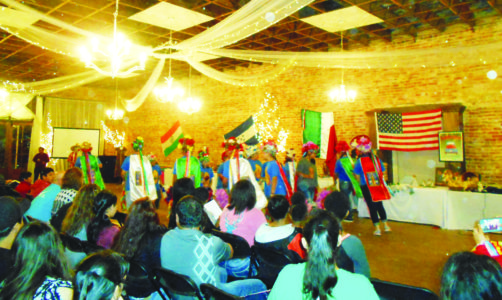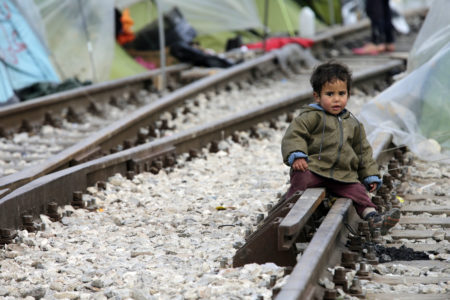By Maureen Smith
How can the church minister to and be strengthened by a new wave of immigrants from South and Central America? According to Dr. Hossfman Ospino, an associate professor of Hispanic ministry and religious education at Boston College, both the nation and the church have done it before and will be able to do it again. Ospino came to the Diocese of Jackson to lead and participate in a series of workshops and encounters in deanery five as part of National Migration Week, Jan. 7-13.
The U.S. Conference of Catholic Bishops has been organizing a theme and providing educational materials for National Migration Week for almost 50 years as an opportunity for the Church to reflect on the circumstances confronting migrants, including immigrants, refugees, children, and victims and survivors of human trafficking.
“The theme of National Migration Week 2018 was ‘Many Journeys, One Family.’ In this context, Dr. Ospino gave a conference to pastors, Lay Ecclesial Ministers, leaders from different parishes and diocesan offices about the history of migration and how this phenomenon is re-defining the Catholicism in the 21st century,” explained Danna Johnson, coordinator of Hispanic Ministry for Pontotoc St. Christopher and head of the Catholic Charities office in Vardaman. “This was a learning experience and an opportunity to re-affirm our missionary spirit as one church here in this diocese,” she added.
In a recent article in America Magazine, Ospino compared the current influx of immigrants to when European Catholics poured into the States. Father Tim Murphy, pastor of Tupelo St. James Parish said he was encouraged by what he heard. “It’s challenging, but it’s possible. We have done this before, we have met the needs of other immigrant groups and we can do it again now,” he said. For both the European immigrants and the Hispanic immigrants, the church is at the center of their cultural experience so their presence is an opportunity to strengthen the church overall.
Father Murphy said Ospino’s statistics and suggestions “really affirm a lot of what we have been doing in this mission diocese.”
Father Murphy said beyond just research, Ospino brings a practical eye to his presentations. “He comes from a hands-on background. He did mission work and pastoral work and retreat work from the time he was 16-years old.”
Amelia McGowan, who heads the Catholic Charities Migrant Support Services, presented a video called “The Cost of Deportation.” The video is meant to raise awareness about what is happening in communities right here and help people comprehend the importance of knowing their rights. She also offered a free legal clinic to families who might have questions about their particular immigration status.
“Many Hispanic families from deanery five attended a unique presentation by Father Octavio Escobar and Ospino. Both presenters were able to challenge our roles as baptized, as Christians, and as immigrant Catholics in our communities,” Johnson said. “Father Octavio based his presentation on the article Dr. Ospino wrote in America Magazine,” she added.
On Friday, despite plummeting temperatures and ice and sleet pressing into the area, Ospino visited Vardaman. While there, he toured a sweet potato packing plant and took advantage of an opportunity to listen to a diverse group of local citizens and the advisory board of Northeast office of Catholic Charities, Inc. The group was able to share the challenges and opportunities all face in attending the different needs in this rural area of Mississippi. “He told me later this rural experience was new to him so the visit to Vardaman was mutually beneficial,” said Father Murphy.
“The outcome of this week was to have an opportunity to come together, as one family, to share, learn, and celebrate the Culture of Encounter,” said Johnson. “We believe that Amelia, Father Octavio, and Ospino made that possible. We all are blessed beyond measure with their presence among us,” she added.
“What we heard really ties in with the (Diocesan) Pastoral Plan to embrace diversity and inspire disciples,” said Father Murphy. He said he hopes he can host Ospino in Mississippi again at a later date.
To learn more about National Migration Week, go to https://www.sharejourney.org
Tag Archives: National Migration Week
Mercy sisters embark on solidarity week with immigrants via social media
By Catholic News Service
WASHINGTON (CNS) – In a strongly worded message prior to National Migration Week Jan.7-13, the president of the Sisters of Mercy of the Americas expressed solidarity with migrants and called on others to stop “blaming migrants and fanning anti-immigrant sentiment that divides our nation.”
“We renew our call for an immediate end to the unjust and immoral treatment of migrants and refugees, recognizing that decades of failed U.S. political and economic policies have contributed to the reasons people have fled homelands,” said the Jan. 3 statement by Mercy Sister Patricia McDermott from the sisters’ headquarters in Silver Spring, Maryland.
The statement says the Sisters of Mercy “stand in solidarity with our sisters and brothers who are forced by poverty, persecution or violence in their native countries to flee their homes, loved ones and livelihoods, desperately seeking safety and the opportunity to provide for themselves and their families.”
The sisters ask for passage of laws to help young adults who came to the United States without documentation, for continuation of a temporary immigration status for migrants from Haiti and Central America, and for an end to expedited deportations, travel bans and long-term detention of immigrants.
“As Pope Francis reminds us: ‘How can we not see the face of the Lord in the face of the millions of exiles, refugees and displaced persons who are fleeing in desperation from the horror of war, persecution and dictatorship?'” the statement says.
The Mercy Sisters kicked-off National Migration Week on social media, recalling their religious order’s migration journey from Ireland to the United States in the 1800s. The next day, they explored some of the “anti-immigrant sentiment in the 19th century, mirrored so often in the rhetoric of our own times,” the statement says.
During subsequent days, they highlighted how their religious community responded to a variety of immigration waves and how U.S. policies abroad drove migration to the U.S., from the 1970s until today.
National Migration Week began under the auspices of the U.S. Catholic bishops as a way “to honor and learn about the diverse communities of the church, as well as the work that the church undertakes to serve immigrants and refugees,” said a Jan. 5 press release from the U.S. Conference of Catholic Bishops.
“National Migration Week allows for reflection upon the biblical teaching concerning welcoming the newcomer and allows us to share the journey with our brothers and sisters who have been forced from their homes,” said Bishop Joe S. Vasquez of Austin, Texas, chairman of the Catholic Bishops’ Committee on Migration.
A statement about the week by Cardinal Daniel N. DiNardo of Galveston-Houston, president of the U.S. Conference of Catholic Bishops, called it a “time of prayer and reflection on our history as a migrant church and nation.”
The cardinal urged Catholics to think about the pope’s message on World Day of Peace, Jan. 1, when he said that migrants and refugees “bring their courage, skills, energy and aspirations, as well as the treasures of their own cultures; and in this way, they enrich the lives of the nations that receive them.”
Many organizations and groups plan to participate in National Migration Week with a focus on Caritas Internationalis’ “Share the Journey” migration campaign, a two-year effort by the humanitarian organization that urges Catholics to understand and get to know refugees and migrants who have fled poverty, hunger, violence, persecution and the effects of climate change in their homeland.
Educational materials and other resources for National Migration Week are available at www.justiceforimmigrants.org/take-action/national-migration-week.
(Editor’s note: The Diocese of Jackson sponsored a number of National Migration Week activities.)
Ospino to speak at National Migration Week events
By Maureen Smith
Parishes in northeast Mississippi will mark National Migration Week, January 7-13, 2018, with five days of educational programing, liturgy and celebrations.. The week offers the faithful a chance to learn more about refugees and migrants in their midst.
The keynote presenter for the week is Hosffman Ospino, an associate professor of theology at Boston College, the director of the V National Encuentro, a member and consultant to the National Catholic Educational Association and the USCCB. He has written several books about Hispanic ministry and Hispanic Catholic identity.
A committee made up of lay ministers Danna Johnson and Raquel Thompson and pastors Father Tim Murphy and Father Mario Solarzano came up with the programs.
“When (Pontotoc) St. Christopher Parish was part of the Glenmary Missioners ministry, it was contacted by Dr. Hosffman Ospino to be part of a national survey of churches with large Hispanic populations. Dr. Ospino is one of the leading experts in Hispanic ministry practices, trends and planning for future ministry in the United States, said Father Murphy, pastor at Tupelo St. James.
“Our Planning Committee has used his research and articles. We asked Danna Johnson to contact him and explore the possibility of a presentation in northeast Mississippi. Beyond all odds, he was available during National Migration Week 2018, and was willing to join us,” he added.
See sidebar for full schedule. For more information about the programs, call the parish at 662-842-4881.

National Migration Week offers opportunity for encounter, faith sharing


VARDAMAN/PONTOTOC – Dancers present samples of their culture during a night of encounter.
By Danna Johnson
VARDAMAN – National Migration Week 2017 was a great opportunity to bring people together. The Migrant Support Center of Catholic Charities, Tupelo, St. James Parish, and the Family Life Center in Vardaman, joined efforts to create a culture of encounter, following the theme Pope Francis inspired for the week.
The observance started at St. James with an Epiphany celebration followed by the documentary “The Invisibles.” More than 100 people attended. Participants were invited to tell their stories and share challenges as immigrants in Mississippi. The conclusion of this first-day event was that “migration is an act of hope.”
The following days, Amelia McGowan, immigration lawyer for Catholic Charities, and director of the Migrant Support Center, offered workshops and free legal clinics in the communities of Corinth, Ripley and Vardaman. Many families traveled from different parts of the deanery to work with her.
Pontotoc St. Christopher Parish celebrated Mass commemorating National Migration Week. Pastor Father Tim Murphy concelebrated with Father Octavio Escovar, visiting from Mexico. He invited all to reflect on Psalm 104: “The Lord remembers his covenants forever.”
On Friday, January 13, the night of cultural encounter was hosted in Vardaman. Nancy Sanchez, cultural specialist for the Migrant Support Center and a team of volunteers of Family Life Center made this first-ever gathering possible. There were demonstrations, food and dancing from various countries including Mexico, Honduras, Guatemala, Puerto Rico, Colombia and India.
Liza May and Sandra Lucious, both natives of Vardaman, opened the night with “Amazing Grace” and gave a presentation of their cultures: Southern and Vardaman.
“This is something to build on” said Northeast Catholic Charities Board president. Nearly 150 people of different cultures in Northeast Mississippi gathered under one roof to celebrate that what we have in common is our diversity.
Sister Gabriela Ramirez from Catholic Charities of Birmingham, Ala., closed the week with a presentation asking the question: Can we develop an inclusive culture?
“This was a powerful topic for awareness and education, and we will find the opportunity to do it again in this year,” said Dorothy Balser, director of community and social outreach ministries for Catholic Charities. Sister Ramirez closed her program by all to pray: “Father, that all of them may be one, as we are one” (Jn. 17, 21).
The U.S. Conference of Catholic Bishops celebrates National Migration Week every January to honor those who leave their homes seeking better lives.
(Danna Johnson is the head of the Family Life Center in Vardaman.)
Charities’ office offers National Migration Week celebrations
By Amelia McGowan
VARDAMAN – The Northeast Mississippi office of Catholic Charities of Jackson is preparing for its third annual National Migration Week celebration, “Creating a Culture of Encounter,” which will take place in locations throughout northeastern Mississippi during Jan. 8-14, 2017. The events will include Eucharistic celebrations, cultural expressions and legal workshops conducted by Catholic Charities’ Migrant Support Center.
With this celebration, the Diocese of Jackson joins dioceses throughout the country in reflecting upon the circumstances confronting migrants in the country, including immigrants, refugees, children and victims and survivors of violent crimes and human trafficking. The theme for National Migration Week 2017 draws attention to Pope Francis’ call to create a culture of encounter, and in doing so to look beyond our own needs and wants to those of others around us.
In the homily given at his first Pentecost as pope, he emphasized the importance of encounter in the Christian faith: “For me this word is very important. Encounter with others. Why? Because faith is an encounter with Jesus, and we must do what Jesus does: encounter others.”
While Mississippi’s immigrant population is not as large as more populous states, it is growing rapidly. The U.S. Census Bureau estimates that Mississippi’s foreign-born population rose from 0.8 percent of the total statewide population in 1990, to 1.4 percent in 2000, and to 2.1 percent in 2013.
The kickoff for National Migration Week is Sunday, January 8, at Tupelo St. James with a bilingual screening of the film “The Invisibles” from 2:30-4:30 p.m.
On Tuesday, Jan. 10, I will provide an immigration workshop and legal consultations at Ripley St. Matthew Parish from 6 – 8 p.m. Wednesday, Jan. 11, will feature Eucharistic celebrations commemorating National Migration Week throughout the area. I will provide a second immigration workshop at Corinth St. James Parish on Thursday, Jan. 12, from 6 – 8 p.m.
The week concludes with a Night of Cultural Expression on Friday, Jan. 13, from 6 – 8 p.m. at a location to be determined, and a closing ceremony at St. James Parish on Saturday, Jan. 14, which will feature Sister Gabriela Ramirez from Catholic Charities of the Diocese of Birmingham, Ala., from 3 – 4:30 p.m.
All are welcome to join in the National Migration Week festivities as we celebrate the diversity of our towns and parishes. For more information about the week’s events call 662-682-9992.
(Amelia McGowan is the Program Director and an Immigration Attorney for Catholic Charities’ Migrant Support Center.)
National Migration Week – set for January – honors most vulnerable
VATICAN CITY (CNS) – Children are the most vulnerable and hardest hit among the world’s migrants and require special protection, Pope Francis said.
“Children are the first among those to pay the heavy toll of emigration, almost always caused by violence, poverty, environmental conditions, as well as the negative aspects of globalization,” he said.
“The unrestrained competition for quick and easy profit brings with it the cultivation of perverse scourges such as child trafficking, the exploitation and abuse of minors and, generally, the depriving of rights intrinsic to childhood as sanctioned by the International Convention on the Rights of the Child,” he said.
The pope made the comments in a message on the theme of “Child Migrants, the Vulnerable and the Voiceless” for the World Day for Migrants and Refugees 2017; the text was released at the Vatican Oct. 13.
The World Day for Migrants and Refugees is observed Jan. 15. In the United States, National Migration Week will be celebrated Jan. 8-14. Click here for a listing of events celebrating the week in the Diocese of Jackson. migration week
In his message, the pope called for greater protection and integration of immigrants and refugees who are minors, especially those who are unaccompanied.
Minors are especially fragile, vulnerable and often invisible and voiceless – unable to claim or unaware of their rights and needs, he said.

A child sits on railroad tracks near a makeshift camp for migrants in late March at the Greek-Macedonian border near the village of in Idomeni, Greece. Children are the most vulnerable and hardest hit among the world’s migrants and require special protection, Pope Francis said. (CNS photo/Armando Babani, EPA) See POPE-MIGRANTS-MESSAGE Oct. 13, 2016.
In particular, they have “the right to a healthy and secure family environment, where a child can grow under the guidance and example of a father and a mother; then there is the right and duty to receive adequate education, primarily in the family and also in the school,” the pope said. Unfortunately, “in many areas of the world, reading, writing and the most basic arithmetic is still the privilege of only a few.”
“Children, furthermore, have the right to recreation,” he added. “In a word, they have the right to be children.”
Christians must offer a dignified welcome to migrants because every human being is precious and “more important than things,” the pope said. “The worth of an institution is measured by the way it treats the life and dignity of human beings, particularly when they are vulnerable, as in the case of child migrants.”
He urged long-term solutions be found to tackle the root causes of migration such as war, human rights violations, corruption, poverty, environmental injustice and natural disasters.
In so many of these scenarios, Pope Francis said, “children are the first to suffer, at times suffering torture and other physical violence, in addition to moral and psychological aggression, which almost always leave indelible scars.”
Among the many factors that make migrants, especially children, more vulnerable, and need to be addressed are: poverty; limited access to the means to survive; “unrealistic expectations generated by the media”; poor literacy; and ignorance about the law, culture and language of host countries, he said.
“But the most powerful force driving the exploitation and abuse of children is demand. If more rigorous and effective action is not taken against those who profit from such abuse, we will not be able to stop the multiple forms of slavery where children are the victims,” he said.
Immigrant adults must cooperate more closely with host communities “for the good of their own children,” he said.
Countries need to work together and communities need to offer “authentic development” for all boys and girls “who are humanity’s hope,” he said.
Saying inadequate funding often “prevents the adoption of adequate policies aimed at assistance and inclusion,” the pope said that instead of programs that help children integrate or safely repatriate, “there is simply an attempt to curb the entrance of migrants, which in turn fosters illegal networks” or governments forcibly repatriate people without any concern “for their ‘best interests.'”
While nations have the right to control migration and protect and safeguard their citizens, Pope Francis said it must be done while carrying out “the duty to resolve and regularize the situation of child migrants,” and fully respecting the rights and needs of the children and their parents “for the good of the entire family.”
The pope praised the “generous service” of all those who work with minors who migrate, urging them to “not tire of courageously living the Gospel, which calls you to recognize and welcome the Lord Jesus among the smallest and most vulnerable.”
Speaking to reporters at the Vatican press office, Cardinal Antonio Maria Veglio, president of the Pontifical Council for Migrants and Travelers, said Christians cannot be xenophobic and they cannot refuse to help welcome immigrants.
While it is impossible for one country “to receive everyone,” he said, that doesn’t mean the problem will be solved by telling immigrants to leave or saying that no one may come.
“It’s a problem that needs to be solved, seek a solution,” he said.
Unfortunately, the cardinal said, people tend to be self-centered and bothered by the presence of “the other.” People prefer to keep to their “ivory tower, their gilded cage and do not want any disturbance” or threats to “the beautiful things we have.”
“This is egoism. This is not human or Christian,” he said.
(Editor’s note: look in the next Mississippi Catholic for a story about what Catholic Charities is doing here in the Diocese of Jackson for migrants, refugees and immigrants.)
